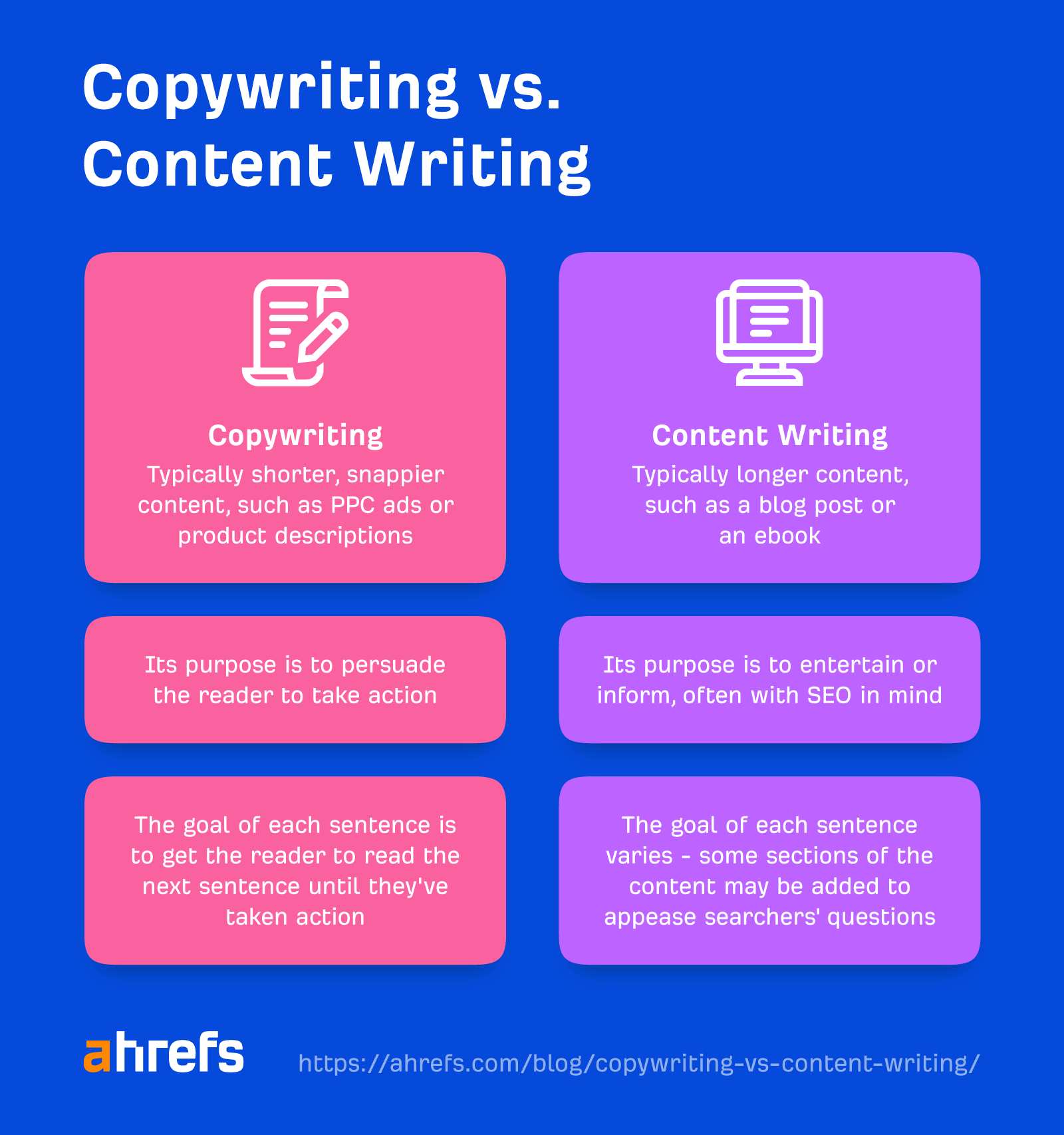But there are two types of writers you can become (or hire): A content writer or a copywriter.
What are the differences between these two crafts? Which should you learn to do or hire for your business? Let’s take a look.
Content writing is, well, writing content—typically to inform or entertain the reader.
Examples of content writing include:
- Blog articles
- Social media posts
- Email newsletters
Copywriting is tweaking written content to persuade the reader to take action, such as making a purchase or signing up for a newsletter.
Examples of copywriting include:
- PPC ads
- Landing page copy
- Product descriptions
While the goal of content writing is to inform or entertain and the goal of copywriting is to sell, they go hand in hand. You typically want to be skilled at both, regardless of your goal.
That said, there are places where copywriters and content writers differ:

Length of content
Traditional content writers typically write longer content that’s 1,000 words or more. They are usually hired to write long-form blog articles, ebooks, or email newsletters.
Traditional copywriters write short, snappy content that’s just a few hundred words. They are usually hired to write short-form advertorials or product descriptions.
That said, content writers can write short-form content like social media posts and copywriters can write long-form content like landing pages. These are generalities, not hard rules.
Purpose
Traditional content writers are often hired to create blog content with the goal of ranking high on Google. They are often well versed in on-page SEO and organic social media.
Traditional copywriters are often hired to write ads, product pages, and landing pages. They know how to use powerful wording to get the reader to take action.
Again, however, these are generalities. There is such a thing as SEO copywriting where you combine these two disciplines to both rank well on Google and also get people to purchase your products or services.
Great content—and great copy—both do three things well:
- Entice the reader to keep reading
- Solve a need for the reader
- Give Google something worth displaying
Let’s talk about these.
Great content is enticing
Interesting, captivating, enticing—if these words don’t describe your writing, it needs editing.
How do you make your content more enticing? By:
- Knowing your audience.
- Being concise in your wording.
- Writing in a conversational tone.
- Editing, editing, and editing some more.
- Mastering transitions and emotional wording.
I wrote a whole guide to becoming a better writer, which I recommend you read to learn more.
Great content solves a need
I mentioned you must know your audience to write great content; part of that means knowing the problems they have and how your product or service solves those problems.
I don’t mean the superficial problem, though—people don’t often buy a T-shirt to stay warm. They buy a T-shirt to support their favorite group, show off their interests, find like-minded people, or feel more attractive and confident.
You must uncover the underlying problem your target market has. Also, show what you have to offer and how it solves that underlying problem.
For example, clothing brand Bombas talk about the exact problems its socks solve, not just that they’re comfortable:

Great content is optimized for search engines
Even though I said SEO is typically pursued by content writers over copywriters, both can benefit from learning it—and charge more too.
Search engine optimization is the process of creating content that is optimized to rank on Google for a particular keyword. While there’s a lot to learn about SEO writing, it boils down to:
- Doing keyword research to determine the best target keyword for a page.
- Knowing the search intent for that keyword, i.e., what is the searcher truly looking for?
- Understanding and implementing on-page SEO.
For example, this page targets the keyword “copywriting vs content writing.”
We found this keyword through keyword research. We chose it because it gets reasonable traffic and has a relatively low Keyword Difficulty (KD) score, according to our Keywords Explorer tool.

Next, we looked at the search intent for this keyword by reviewing the competing pages in the search results. I found that most searchers seem to be looking for information on the differences between the two in order to choose a career path or make a hiring decision—so that’s what I focused this article on.

Finally, to help with on-page SEO, I looked at the People Also Ask box on Google. I’ve included answers to some of these common questions within this article:

Of course, there’s more to SEO than just what I’ve shared here. Go read our beginner’s guide to SEO to learn more.
According to Indeed, the average content writer’s salary in the U.S. is $56,076 per year. Compare that with the average copywriter’s salary of $58,560 per year.

Copywriting tends to pay more than content writing because it’s easy to see the immediate impact of good copy on a company’s bottom line.
Think about it. Say you hire a person to write copy. The copy they wrote then immediately increases your conversion rate by 2% and puts an extra thousand dollars in your bank account.
You’d pay them more, wouldn’t you?
Compare that to hiring a content writer who writes a blog article for you, which you aren’t sure whether or not the article did or will make you money back. It’s easy to see why copywriters make more money than content writers.
That said, I have never advertised myself as a “copywriter.” I also make far more than a typical copywriter for writing content. That’s because I understand SEO and marketing as well, and the articles I write for my clients typically make their way to the top of Google’s search results.
Also, I understand both copywriting and content writing, which allows me to charge more.
Keep in mind that my first-ever freelance writing gig made me a measly $5 for a nearly 3,000-word article. So know that it takes time to learn the skills—both writing skills and being able to market yourself—to reach higher pay.
If you’re here wondering who you should hire—a copywriter or a content writer—the answer isn’t totally black and white.
If you want someone to write product descriptions, landing page copy, or copy for PPC ads, consider a copywriter. If you want someone to write blog posts, email newsletters, or ebooks, hire a content writer.
But honestly, the words “copywriter” and “content writer” are just different titles for what is basically the same job—putting words on a screen that inform, entertain, and ultimately get people to find and want to buy from your brand.
My suggestion is to look for a copywriter with SEO skills. They will be the most expensive but also (hopefully) the most helpful hire for your business.
Check out my guide to hiring an SEO team for more insight.
Final thoughts
Copywriting and content writing have their differences on paper. But ultimately, they’re just titles.
The true difference is whether the person who claims a title is actually a skilled writer in the industry they are advertising themselves. If they are, their title doesn’t matter, and they will be an asset to your business.
Questions or comments? Ping me on Twitter.


